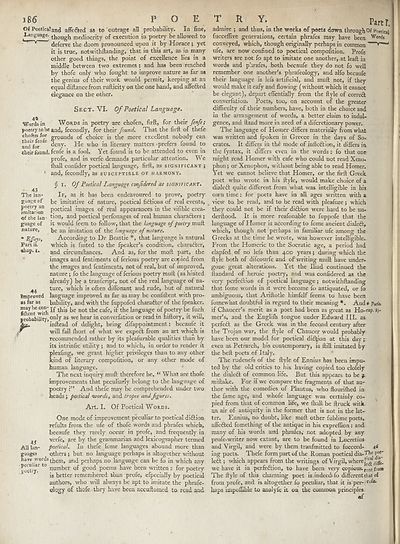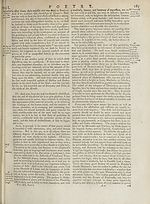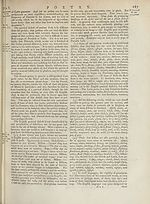Encyclopaedia Britannica > Volume 15, PLA-RAM
(224) Page 186
Download files
Complete book:
Individual page:
Thumbnail gallery: Grid view | List view

43
The Ian*
186 POE
Of Poetical and affe&ed as to outrage all probability. In fine,
language, mediocrity of execution in poetry be allowed to
deferve the doom pronounced upon it by Horace; yet
it is true, notwithftanding, that in this art, as in many
other good things, the point of excellence lies in a
middle between two extremes ; and has been reached
by thofe only who fought to improve nature as far a#
the genius of their work would permit, keeping at an
equal diltance from rufticity on the one hand, and affe&ed
elegance on the other.
Sect. VI. Of Poetical Language.
Words in Words in poetry are chofen, firft, for their fenfe;
poetry to be and, fecondly, for their fund. That the firit of thefe
chofen for gr0unds of choice is the more excellent nobody can
and* for" e deny. He who in literary matters prefers found to
their found, fenfe is a fool. Yet found is to be attended to even in
profe, and in verfe demands particular attention. We
fhall conftder poetical language, firlt, as significant;
’ and, fecondly, as susceptible of harmony.
$ I. Of Poetical Language confclered as significant.
If, as it has been endeavoured to prove, poetry
guage of be imitative of nature, poetical fi&ions of real events,
Imitafion Poet^ca^ images of real appearances in the vifible crea-
©f the lan- ti°n, and poetical perfonages of real human charafters ;
guage of it would feem to follow, that the language of poetry mull
nature, be an imitation of the language of nature.
* Ejfays, According to Dr Beattie *, that language is natural
Panii. which is fuited to the fpeaker’s condition, charadter,
«liap. t. anj circumftances. And as, for the moft part, the
images and fentiments of ferious poetry are copied from
the images and fentiments, not of real, but of improved,
nature ; fo the language of ferious poetry mult (as hinted
already) be a tranfeript, not of the real language of na-
^ ture, which is often dilfonant and rude, but of natural
Improved language improved as far as may be conliftent with pro¬
as far as bability, and with the fuppofed character of the fpeaker.
McnTwhh ^ not ^ie ca^e> 1 t^e language of poetry be fuch
probability, oniy as we ^ear 'n converfation or read in hiftory, it will,
fe. inftead of delight, bring difappointment: becaule it
^ will fall Hiort of what we expect from an art which is
recommended rather by its pleafurable qualities than by
its intrinfic utility ; and to which, in order to render it
pleafing, we grant higher privileges than to any other
kind of literary compofition, or any other mode of
human language.
The next inquiry muft therefore be, “ What are thofe
improvements that peculiarly belong to the language of
poetry i” And thefe may be comprehended under two
heads ; poetical ’words, and tropes and fgures.
Art. L Of Poetical Words.
One mode of improvement peculiar to poetical di&ion
refults from, the ufe of thofe words and phrafes which,
becaufe they rarely occur in profe, and frequently in
^ verfe, are by the grammarian and lexicographer termed
All lan- poetical. In thefe fome languages abound more than
guages others ; but no language perhaps is altogether without
have words tbem, and perhaps no language can be fo in which any
° number of good poems have been written: for poetry
is better remembered than profe, efpecially by poetical
authors, who will always be apt to imitate the phrafe-
ology of thofe they have been accultomed to read and
R Y.
Part L
admire ; and thus, in the works of poets down through Of Poetical
fucceffive generations, certain phrafes may have been Words
conveyed, which, though originally perhaps in common ""'y
ufe, are now confined to poetical compofition. Profe
writers are not fo apt to imitate one another, at leaft in
words and phrafes, both becaufe they do not fo well
remember one another’s phrafeology, and alfo btcaufe
their language is lefs artificial, and muft not, if they
would make it eafy and flowing (without which it cannot
be elegant), depart eflentially from the ftyle of correct
converfation. Poets, too, on account of the greater
difficulty of their numbers, have, both in the choice and
in the arrangement of words, a better claim to indul¬
gence, and ftand more in need of a diferetionary power.
The language of Homer differs materially from what
was written and fpoken in Greece in the days of So¬
crates. It differs in the mode of infiedtion, it differs in
the fyntax, it differs even in the words: fo that one
might read Homer with eafe who could not read Xeno¬
phon; or Xenophon, without being able to read Homer.
Yet we cannot believe that Homer, or the firft Greek
poet who wrote in his ftyle, would make choice of a
dialed quite different from what was. intelligible in his
own time : for poets have in all ages written with a
view to he read, and to be read with pleafure; which
they could not be if their diction were hard to be un-
derftood. It is more reafonable to fuppofe that the
language of Homer is according to fome ancient dialeft,
which, though not perhaps in familiar ufe among the
Greeks at the time he wrote, was however intelligible^
P'rom the Homeric to the Socratic age, a period had
elapfed of no lefs than 400 years; during which the
ftyle both of difeourfe and of writing muft have under¬
gone great alterations. Yet the Iliad continued the
llandard of heroic poetry, and was confidered as the
very perfection of poetical language; notwithftanding
that fome words in it were become fo antiquated, or fo
ambiguous, that Ariftotle himfelf feems to have been
fomewhat doubtful in regard to their meaning *. And# jv,V„
if Chaucer’s merit as a poet had been as great as Ho-eap.
mer’s, and the Englifli tongue under Edward III. as
perfeft as the Greek was in the fecond century after
the Trojan war, the ftyle of Chaucer would probably
have been our model for poetical didftion at this day ;.
even as Petrarch, his contemporary, is ftill imitated by
the heft poets of Italy.
The rudenefs of the ftyle of Ennius has been impu¬
ted by the old critics to his having copied too clolely
the dialeft of common life. But this appears to be 4
miftake. For if we compare the fragments of that au¬
thor with the comedies of Plautus, who flourifhed in
the fame age, and whofe language was certainly co¬
pied from that of common life, we lhall be ftruck witk
an air of antiquity in the former that is not in the lat¬
ter. Ennius, no doubt, like moft other fublime poets,
affected fomething of the antique in his expreffion : and.
many of liis words and phrafes,' not adopted by any
profe-writer now extant, are to he found in Lucretius
and Virgil, and were by them tranfmitted to fucceed- 4*
ing poets. Thefe form part of the Roman poetical dia-'f^ P^'
ledl; which appears from the writings of Virgil, where^
we have it in perfection, to have been very copious. rgnt fi-oi*
The ftyle of this charming poet is indeed fo different that of
from profe, and is altogether fo peculiar, that it is per-
haps impoflible to analyfe it on the common principles
The Ian*
186 POE
Of Poetical and affe&ed as to outrage all probability. In fine,
language, mediocrity of execution in poetry be allowed to
deferve the doom pronounced upon it by Horace; yet
it is true, notwithftanding, that in this art, as in many
other good things, the point of excellence lies in a
middle between two extremes ; and has been reached
by thofe only who fought to improve nature as far a#
the genius of their work would permit, keeping at an
equal diltance from rufticity on the one hand, and affe&ed
elegance on the other.
Sect. VI. Of Poetical Language.
Words in Words in poetry are chofen, firft, for their fenfe;
poetry to be and, fecondly, for their fund. That the firit of thefe
chofen for gr0unds of choice is the more excellent nobody can
and* for" e deny. He who in literary matters prefers found to
their found, fenfe is a fool. Yet found is to be attended to even in
profe, and in verfe demands particular attention. We
fhall conftder poetical language, firlt, as significant;
’ and, fecondly, as susceptible of harmony.
$ I. Of Poetical Language confclered as significant.
If, as it has been endeavoured to prove, poetry
guage of be imitative of nature, poetical fi&ions of real events,
Imitafion Poet^ca^ images of real appearances in the vifible crea-
©f the lan- ti°n, and poetical perfonages of real human charafters ;
guage of it would feem to follow, that the language of poetry mull
nature, be an imitation of the language of nature.
* Ejfays, According to Dr Beattie *, that language is natural
Panii. which is fuited to the fpeaker’s condition, charadter,
«liap. t. anj circumftances. And as, for the moft part, the
images and fentiments of ferious poetry are copied from
the images and fentiments, not of real, but of improved,
nature ; fo the language of ferious poetry mult (as hinted
already) be a tranfeript, not of the real language of na-
^ ture, which is often dilfonant and rude, but of natural
Improved language improved as far as may be conliftent with pro¬
as far as bability, and with the fuppofed character of the fpeaker.
McnTwhh ^ not ^ie ca^e> 1 t^e language of poetry be fuch
probability, oniy as we ^ear 'n converfation or read in hiftory, it will,
fe. inftead of delight, bring difappointment: becaule it
^ will fall Hiort of what we expect from an art which is
recommended rather by its pleafurable qualities than by
its intrinfic utility ; and to which, in order to render it
pleafing, we grant higher privileges than to any other
kind of literary compofition, or any other mode of
human language.
The next inquiry muft therefore be, “ What are thofe
improvements that peculiarly belong to the language of
poetry i” And thefe may be comprehended under two
heads ; poetical ’words, and tropes and fgures.
Art. L Of Poetical Words.
One mode of improvement peculiar to poetical di&ion
refults from, the ufe of thofe words and phrafes which,
becaufe they rarely occur in profe, and frequently in
^ verfe, are by the grammarian and lexicographer termed
All lan- poetical. In thefe fome languages abound more than
guages others ; but no language perhaps is altogether without
have words tbem, and perhaps no language can be fo in which any
° number of good poems have been written: for poetry
is better remembered than profe, efpecially by poetical
authors, who will always be apt to imitate the phrafe-
ology of thofe they have been accultomed to read and
R Y.
Part L
admire ; and thus, in the works of poets down through Of Poetical
fucceffive generations, certain phrafes may have been Words
conveyed, which, though originally perhaps in common ""'y
ufe, are now confined to poetical compofition. Profe
writers are not fo apt to imitate one another, at leaft in
words and phrafes, both becaufe they do not fo well
remember one another’s phrafeology, and alfo btcaufe
their language is lefs artificial, and muft not, if they
would make it eafy and flowing (without which it cannot
be elegant), depart eflentially from the ftyle of correct
converfation. Poets, too, on account of the greater
difficulty of their numbers, have, both in the choice and
in the arrangement of words, a better claim to indul¬
gence, and ftand more in need of a diferetionary power.
The language of Homer differs materially from what
was written and fpoken in Greece in the days of So¬
crates. It differs in the mode of infiedtion, it differs in
the fyntax, it differs even in the words: fo that one
might read Homer with eafe who could not read Xeno¬
phon; or Xenophon, without being able to read Homer.
Yet we cannot believe that Homer, or the firft Greek
poet who wrote in his ftyle, would make choice of a
dialed quite different from what was. intelligible in his
own time : for poets have in all ages written with a
view to he read, and to be read with pleafure; which
they could not be if their diction were hard to be un-
derftood. It is more reafonable to fuppofe that the
language of Homer is according to fome ancient dialeft,
which, though not perhaps in familiar ufe among the
Greeks at the time he wrote, was however intelligible^
P'rom the Homeric to the Socratic age, a period had
elapfed of no lefs than 400 years; during which the
ftyle both of difeourfe and of writing muft have under¬
gone great alterations. Yet the Iliad continued the
llandard of heroic poetry, and was confidered as the
very perfection of poetical language; notwithftanding
that fome words in it were become fo antiquated, or fo
ambiguous, that Ariftotle himfelf feems to have been
fomewhat doubtful in regard to their meaning *. And# jv,V„
if Chaucer’s merit as a poet had been as great as Ho-eap.
mer’s, and the Englifli tongue under Edward III. as
perfeft as the Greek was in the fecond century after
the Trojan war, the ftyle of Chaucer would probably
have been our model for poetical didftion at this day ;.
even as Petrarch, his contemporary, is ftill imitated by
the heft poets of Italy.
The rudenefs of the ftyle of Ennius has been impu¬
ted by the old critics to his having copied too clolely
the dialeft of common life. But this appears to be 4
miftake. For if we compare the fragments of that au¬
thor with the comedies of Plautus, who flourifhed in
the fame age, and whofe language was certainly co¬
pied from that of common life, we lhall be ftruck witk
an air of antiquity in the former that is not in the lat¬
ter. Ennius, no doubt, like moft other fublime poets,
affected fomething of the antique in his expreffion : and.
many of liis words and phrafes,' not adopted by any
profe-writer now extant, are to he found in Lucretius
and Virgil, and were by them tranfmitted to fucceed- 4*
ing poets. Thefe form part of the Roman poetical dia-'f^ P^'
ledl; which appears from the writings of Virgil, where^
we have it in perfection, to have been very copious. rgnt fi-oi*
The ftyle of this charming poet is indeed fo different that of
from profe, and is altogether fo peculiar, that it is per-
haps impoflible to analyfe it on the common principles
Set display mode to:
![]() Universal Viewer |
Universal Viewer | ![]() Mirador |
Large image | Transcription
Mirador |
Large image | Transcription
Images and transcriptions on this page, including medium image downloads, may be used under the Creative Commons Attribution 4.0 International Licence unless otherwise stated. ![]()
| Encyclopaedia Britannica > Encyclopaedia Britannica > Volume 15, PLA-RAM > (224) Page 186 |
|---|
| Permanent URL | https://digital.nls.uk/191903688 |
|---|
| Attribution and copyright: |
|
|---|
| Description | Ten editions of 'Encyclopaedia Britannica', issued from 1768-1903, in 231 volumes. Originally issued in 100 weekly parts (3 volumes) between 1768 and 1771 by publishers: Colin Macfarquhar and Andrew Bell (Edinburgh); editor: William Smellie: engraver: Andrew Bell. Expanded editions in the 19th century featured more volumes and contributions from leading experts in their fields. Managed and published in Edinburgh up to the 9th edition (25 volumes, from 1875-1889); the 10th edition (1902-1903) re-issued the 9th edition, with 11 supplementary volumes. |
|---|---|
| Additional NLS resources: |
|

